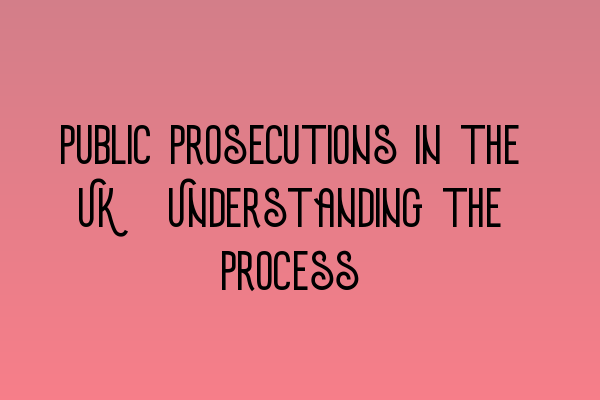Public Prosecutions in the UK: Understanding the Process
When it comes to criminal law in the UK, the process of public prosecutions plays a crucial role. Understanding how public prosecutions work is essential for aspiring solicitors and anyone interested in the intricacies of the UK legal system.
In this article, we will demystify the process of public prosecutions in the UK, providing you with a comprehensive overview of its various stages and key players.
What are Public Prosecutions?
Public prosecutions refer to the legal proceedings taken by the Crown Prosecution Service (CPS) on behalf of the public. The CPS is an independent authority responsible for prosecuting criminal cases in England and Wales. Its primary role is to ensure that those who have committed crimes are brought to justice and that the public interest is maintained.
Now, let’s dive into the detailed process of public prosecutions:
1. Investigation Stage
The process of public prosecutions begins with the investigation stage. This is when the police gather evidence and interview witnesses to build a case against the alleged perpetrator. The police work closely with the CPS during this stage to ensure the collection of sufficient evidence for a successful prosecution.
During the investigation stage, it is crucial for the police to follow proper procedures, adhere to the principles of fairness, and respect the rights of the suspect. This ensures that any evidence collected is admissible in court.
Related Article: SQE Exam Prep: Essential Study Materials for Aspiring Solicitors
2. Charging Decision
Once the investigation is complete, the CPS reviews the gathered evidence to determine whether there is enough to charge the suspect with a criminal offense. The charging decision is based on the two-stage test set out in the Code for Crown Prosecutors:
- Is there sufficient evidence to provide a realistic prospect of conviction?
- Is it in the public interest to prosecute?
If the CPS believes that there is sufficient evidence and it is in the public interest to prosecute, they will proceed with charging the suspect.
3. Court Proceedings
After a suspect has been charged, the case moves to the court proceedings stage. This is when the matter is presented before a judge and potentially a jury, depending on the nature of the case.
The CPS acts as the prosecutor in court, presenting the evidence against the defendant and putting forward the case on behalf of the public. Their role is to prove the guilt of the accused beyond a reasonable doubt.
The defense, on the other hand, represents the accused and aims to cast doubt on the prosecution’s case or provide an alternative explanation for the alleged crime.
During court proceedings, both the prosecution and defense can call witnesses, present expert testimonies, and cross-examine each other’s evidence.
Related Article: Demystifying the Solicitors Qualifying Examination Format
4. Verdict and Sentencing
At the conclusion of the court proceedings, the judge or the jury (in cases where a jury is present) will deliver a verdict. If the accused is found guilty, the judge will proceed to sentencing.
The sentencing aims to ensure that the punishment is proportionate to the severity of the offense committed. Factors such as the nature of the crime, the defendant’s criminal history, and any aggravating or mitigating circumstances will be taken into account during the sentencing process.
Related Article: SQE Exam for International Lawyers: Challenges and Success Strategies
5. Appeals
After the verdict and sentencing, both the prosecution and the defense have the right to appeal the decision. An appeal allows for a review of the case by a higher court, ensuring that the legal process has been followed correctly and that justice has been served.
Appeals may be based on errors in the legal process, newly discovered evidence, or improper jury instructions. The Court of Appeal is responsible for considering appeals in most criminal cases in England and Wales.
Conclusion
Understanding the process of public prosecutions in the UK is vital for anyone involved in the legal profession. From the initial investigation stage to the final verdict, each step is meticulously carried out to ensure a fair trial and uphold the rule of law.
To learn more about the legal profession and prepare for the Solicitors Qualifying Examination (SQE), make sure to check out our related articles:
- SQE Exam Prep: Essential Study Materials for Aspiring Solicitors
- Demystifying the Solicitors Qualifying Examination Format
- SQE Exam for International Lawyers: Challenges and Success Strategies
- LLC Formation Made Simple: Step-by-Step Guide for UK Entrepreneurs
- LLC Formation: A Step-by-Step Guide for UK Entrepreneurs
